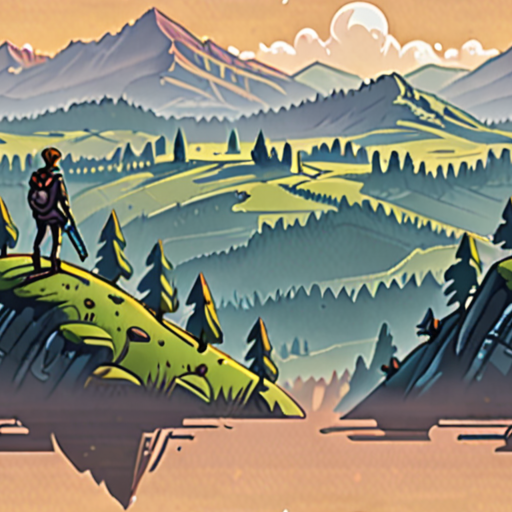Effective project management is crucial for the success of any game development project, especially for independent game developers who often face unique challenges and tight budgets. As the gaming industry continues to grow and evolve, the demand for skilled project managers has never been higher. In this article, we’ll explore the essential skills and strategies required to master indie game project management, from understanding agile methodologies and effective communication strategies to financial planning and budgeting. We’ll delve into the world of indie game development, examining the benefits of having a dedicated project manager, revenue streams for indie game developers and publishers, and the opportunities for advancement and career growth in gaming project management.

The 5 Basics of Project Management
As an indie game developer, understanding the fundamentals of project management is crucial for delivering successful games on time and within budget.
-
Initiation Phase
This phase involves defining the project scope, goals, and deliverables. It sets the stage for the entire project lifecycle and ensures everyone involved is aligned with the project vision.
I always start my projects by defining the project charter, which outlines the project objectives, stakeholders, and timelines. This helps me stay focused and ensure everyone is on the same page.
For example, I recently worked on a project where we had to develop a multiplayer mode for our game. We defined the project scope, created a project plan, and established key performance indicators (KPIs) to measure progress.
-
Planning Phase
In this phase, we create a detailed project schedule, allocate resources, and identify potential risks. It’s essential to have a solid plan in place to ensure the project stays on track.
I use project management tools like Trello and Asana to create boards, lists, and cards that help me visualize the project workflow and assign tasks to team members.
For instance, when developing a new game feature, I create a task list with specific deadlines and assign responsibilities to team members. This helps us work efficiently and meet the project timeline.
-
Execution Phase
This phase involves executing the project plan, completing tasks, and delivering the project outcomes. It requires effective communication, collaboration, and problem-solving skills.
I believe that regular check-ins and feedback sessions are critical during this phase. They help us identify and resolve issues promptly, ensuring the project stays on track.
When working on a tight deadline, I prioritize tasks based on urgency and importance. This helps me manage my time effectively and ensure the project meets its milestones.
-
Monitoring and Control Phase
In this phase, we monitor project progress, identify deviations from the plan, and take corrective actions. It’s essential to have a robust tracking system in place to ensure the project stays on course.
I use project management software like Jira and Basecamp to track project progress, identify bottlenecks, and optimize workflows.
For example, when developing a new game update, I set up a dashboard to track progress, identify issues, and make data-driven decisions to improve the project outcome.
-
Closure Phase
This final phase involves wrapping up the project, documenting lessons learned, and evaluating project success. It’s essential to reflect on what went well and what didn’t, so we can apply those lessons to future projects.
I believe that conducting a post-project review is crucial for identifying areas of improvement and applying those lessons to future projects.
When closing out a project, I document the project outcomes, lessons learned, and recommendations for future improvements. This helps me refine my project management approach and deliver better results in the long run.
Do Game Studios Have Project Managers?
As a project manager in the gaming industry, I can attest that having a skilled project manager is crucial for the success of any game studio.
Game development involves numerous tasks, timelines, and stakeholders, making it essential to have someone who can oversee the entire process and ensure everything runs smoothly.
The Role of a Project Manager in Game Development
A project manager in a game studio is responsible for planning, organizing, and controlling the game development process from start to finish. Their primary goals are to deliver high-quality games on time, within budget, and to meet stakeholder expectations.
- Developing and managing project schedules, budgets, and resource allocation
- Coordinating with cross-functional teams, including designers, artists, programmers, and testers
- Identifying and mitigating risks, issues, and conflicts
- Communicating project progress, status, and changes to stakeholders
- Ensuring compliance with project scope, quality standards, and regulatory requirements
Key Skills Required for a Project Manager in Game Development
To excel as a project manager in game development, one needs to possess a unique blend of technical, business, and interpersonal skills. Some essential qualities include:
- Strong understanding of game development processes, technologies, and tools
- Excellent communication, leadership, and problem-solving skills
- Ability to work under pressure, manage stress, and adapt to changing circumstances
- Knowledge of project management methodologies, such as Agile, Scrum, or Waterfall
- Experience with project management software, like Asana, Trello, or Jira
Benefits of Having a Project Manager in a Game Studio
Having a dedicated project manager can bring numerous benefits to a game studio, including:
- Improved project visibility, transparency, and accountability
- Enhanced team collaboration, productivity, and morale
- Increased efficiency, reduced costs, and better resource utilization
- Better risk management, issue resolution, and conflict avoidance
- Improved stakeholder satisfaction, trust, and loyalty
Conclusion
In conclusion, game studios rely heavily on project managers to ensure successful game development outcomes. By understanding the role, responsibilities, and required skills of a project manager, game studios can make informed decisions about hiring and developing these critical professionals.
How Much Do Successful Indie Game Developers Make?
The average annual pay for an indie game developer in the United States is around $108,471 per year.
- This translates to approximately $5,215 per hour, which is equivalent to $2,085 per week or $9,039 per month.
Indie game developers can earn money through various channels, including:
- Sales of their games on platforms like Steam, GOG, and the App Store.
- Monetization through in-game ads, sponsorships, and affiliate marketing.
- Licensing their games to other companies or publishers.
- Offering services like game development, consulting, and training.
Some notable examples of successful indie game developers include:
- Polytron Corporation , known for developing the critically acclaimed game Fez.
- Supergiant Games , creators of the award-winning Bastion and Transistor.
- Cuphead Studio , makers of the visually stunning Cuphead.
These developers have achieved significant success and financial rewards through their innovative games and business models.
Revenue Streams for Indie Game Developers
Indie game developers can tap into various revenue streams, including:
- Game sales on digital storefronts.
- In-app purchases and microtransactions.
- Advertising and sponsored content.
- Licensing and royalties.
- Merchandise and physical products.
Key Takeaways
Successful indie game developers can earn substantial incomes through a combination of game sales, monetization strategies, and service offerings.
By understanding the various revenue streams available, indie game developers can increase their chances of achieving financial success in the gaming industry.

How to Become a Project Manager in Gaming
To become a project manager in gaming, I recommend pursuing a bachelor’s degree in project management, game design, computer science, or a related field.
- Certifications in project management, such as PMP or Scrum Master, can enhance your credentials and demonstrate expertise in managing complex projects.
- Familiarize yourself with game development pipelines, including planning, execution, and delivery phases.
- Develop strong communication and leadership skills to effectively manage cross-functional teams and stakeholders.
- Stay up-to-date with industry trends, technologies, and best practices through continuous learning and professional development.
- Consider gaining experience in game development by working on personal projects or contributing to open-source games.
- Become familiar with project management tools and software, such as Asana, Trello, or Jira, to streamline workflows and collaborate with team members.
- Network with professionals in the gaming industry to learn about job opportunities and gain insights into the field.
- Pursue internships or entry-level positions in game development companies to gain hands-on experience and build your portfolio.
- Continuously develop your skills in areas such as Agile methodology, risk management, and stakeholder engagement.
- Join online communities, forums, and social media groups to stay connected with industry professionals and stay informed about industry developments.
Some popular resources for game development and project management include:
- GameDev.net: A community-driven website offering tutorials, articles, and resources for game development.
- Project Management Institute (PMI): A professional organization providing certification programs, training, and resources for project managers.
- Gamasutra: A leading online publication covering game development, design, and business topics.
- Indie Game Developers: A community-driven platform offering resources, tutorials, and networking opportunities for independent game developers.
By following these steps and staying committed to your goals, you can increase your chances of becoming a successful project manager in the gaming industry.
Can Project Managers Make 100K?
As an experienced project manager, I’ve often been asked whether it’s possible to earn a six-figure income in this field.
- The short answer is yes, it’s definitely possible to make 100K or more as a project manager.
- In fact, according to various sources, senior project managers can earn upwards of $150,000 per year.
Factors Affecting Project Manager Salary
Several factors contribute to a project manager’s salary, including:
- Industry: Project managers working in high-paying industries such as finance, healthcare, or technology tend to earn more than those in lower-paying sectors.
- Experience: Seniority plays a significant role in determining salary, with more experienced project managers commanding higher pay.
- Certifications: Holding certifications like the Project Management Professional (PMP) or Agile Certified Practitioner (ACP) can increase earning potential.
- Location: Project managers based in urban areas or regions with a high cost of living may earn more than those in rural areas.
Salary Ranges for Project Managers
Here are some approximate salary ranges for project managers in the United States:
- Entry-level project managers: $60,000 – $80,000 per year
- Mid-level project managers: $80,000 – $110,000 per year
- Senior project managers: $110,000 – $150,000 per year
- Executive-level project managers: $150,000 – $200,000 per year
How to Increase Earning Potential
To increase earning potential as a project manager, consider the following strategies:
- Pursue advanced certifications or education
- Gain experience in high-paying industries or roles
- Negotiate salary increases based on performance and market rates
- Develop skills in high-demand areas like agile methodology or digital transformation
Conclusion
While making 100K as a project manager requires hard work, dedication, and strategic career planning, it’s definitely achievable for those who are willing to put in the effort.

Project Manager Salary in GTA
The estimated total pay for a Project Manager in GTA is $88,874 per year.
- According to recent data, the average salary for a Project Manager in GTA is around $82,332 per year.
- This figure may vary depending on factors such as location, industry, and level of experience.
- As a project manager, you can expect to earn a competitive salary in GTA, making it an attractive option for those in the field.
Indie Dev Games is a great resource for learning more about project management and finding job opportunities in GTA.
For more information on project management salaries and job openings, visit our website at https://indiedevgames.com/ .
Competitors in the Field
Some notable companies in the GTA area that offer project management positions include:
- Company A: Known for their innovative approach to project management, Company A offers competitive salaries and benefits.
- Company B: With a strong focus on teamwork and collaboration, Company B provides a dynamic work environment and opportunities for growth.
- Company C: As a leading provider of project management services, Company C offers a range of job opportunities and training programs.
Conclusion
In conclusion, the salary for a project manager in GTA is highly competitive, with an estimated total pay of $88,874 per year and an average salary of $82,332 per year.
With a range of job opportunities available, GTA is an attractive option for project managers looking to advance their careers.
We hope this information has been helpful in your search for project management jobs and salaries in GTA.




0 Comments